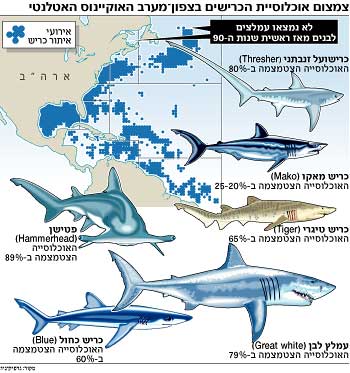Humans are dangerous to the future of sharks in the Atlantic
Andrew Rabkin, New York Times

Reduction of the shark population in the northwest Atlantic Ocean
Sharks are perceived by humans as dangerous animals, and information about a reduction in their number should perhaps be good news. However, experts express concern over findings published last week in the journal "Science" according to which shark populations in the northwest Atlantic Ocean have shrunk by more than half since 1986.
The researchers from Dalhousie University in Halifax attribute the phenomenon to an increase in the scope of commercial and recreational shark fishing. The concern stems from a fear that the decrease in the number of "main predators" in the ocean will significantly affect the food chain in the sea. According to experts, it may take decades to reverse the trend.
"Like the ax and the plow, the rod and the net can bring about significant changes in the ecological structure," said Dr. James Kitchell, a biologist from the University of Wisconsin. "We fish the top of the food chain," he warned.
According to the researchers, there is no evidence that the decrease is due to a natural cycle. Several experts not involved in the study said it provides the first evidence of ocean-wide decline. The researchers noted that the reduction in the number of sharks should not affect the number of attacks on humans, which are still rare, and in any case occur mostly as a result of an increase in the number of people bathing in the sea.
The researchers discovered the trends through a statistical analysis of records made by vessels that caught tuna and swordfish. These fishermen are not interested in catching sharks, and about a decade ago they changed equipment to allow the sharks to be released. However, according to Julia Baum who headed the researchers, the catch rate of sharks with these rods serves as a measure of their prevalence in the ocean.
According to Baum, the main threat to sharks is European fishing vessels, which fish for sharks because of the popularity of their meat, as well as amateur fishing. In the US, fishing is limited by federal regulations. The researchers emphasized that even if the fishing volume decreases, the slow reproduction rate of the sharks will delay their recovery.
Dr. Huater, from the "Mot" laboratory, agrees with this assessment: "Sharks have adapted to being predators, not prey. If we bring them to the brink and then decide that we don't like what happened, it will already be too late."
In the area studied, from Newfoundland to Brazil, a reduction was found in the populations of all sharks, except for the blue shark. A particularly large reduction was found in species found near the coast, such as hammerheads (89%), and in sharks typical of open waters, such as the basking shark (80%).
